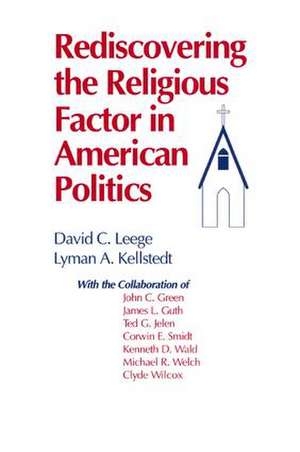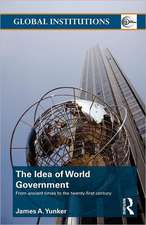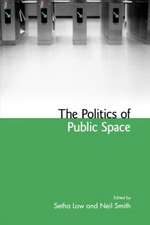Rediscovering the Religious Factor in American Politics
Autor David C. Leege, Lyman A. Kellstedten Limba Engleză Paperback – 31 oct 1993
| Toate formatele și edițiile | Preț | Express |
|---|---|---|
| Paperback (1) | 370.71 lei 43-57 zile | |
| Taylor & Francis – 31 oct 1993 | 370.71 lei 43-57 zile | |
| Hardback (1) | 1005.97 lei 43-57 zile | |
| Taylor & Francis – 30 iun 1993 | 1005.97 lei 43-57 zile |
Preț: 370.71 lei
Nou
Puncte Express: 556
Preț estimativ în valută:
70.94€ • 73.65$ • 59.16£
70.94€ • 73.65$ • 59.16£
Carte tipărită la comandă
Livrare economică 24 martie-07 aprilie
Preluare comenzi: 021 569.72.76
Specificații
ISBN-13: 9781563241345
ISBN-10: 156324134X
Pagini: 320
Ilustrații: tables, references, index
Dimensiuni: 152 x 229 x 25 mm
Greutate: 0.48 kg
Ediția:1
Editura: Taylor & Francis
Colecția Routledge
Locul publicării:Oxford, United Kingdom
ISBN-10: 156324134X
Pagini: 320
Ilustrații: tables, references, index
Dimensiuni: 152 x 229 x 25 mm
Greutate: 0.48 kg
Ediția:1
Editura: Taylor & Francis
Colecția Routledge
Locul publicării:Oxford, United Kingdom
Cuprins
I: Why Study Religion in the Context of Politics; 1: Religion and Politics in Theoretical Perspective; 2: Measurement Strategies in the Study of Religion and Politics; II: Religion as an Orientation toward Group; 3: Knowing God's Many People: Denominational Preference and Political Behavior; 4: Religious Group Identifications: Toward a Cognitive Theory of Religious Mobilization; 5: From Lambs to Sheep: Denominational Change and Political Behavior; III: Religion as a Set of Public and Private Practices; 6: Church Involvement and Political Behavior; 7: The Public Dimension of Private Devotionalism; 8: Salience: The Core Concept?; IV: Doctrinal, Experiential, and Worldview Measures; 9: Doctrinal Beliefs and Political Behavior: Views of the Bible; 10: The Political Effects of the Born-Again Phenomenon; 11: Religious Worldviews and Political Philosophies: Capturing Theory in the Grand Manner through Empirical Data; V: Leadership Stimuli and Reference Groups; 12: Are the Sheep Hearing the Shepherds? Cue Perceptions, Congregational Responses, and Political Communication Processes; 13: Preaching to the Converted: The Causes and Consequences of Viewing Religious Television; VI: Does Religion Matter in Studies of Voting Behavior and Attitudes?; 14: Religion, the Neglected Variable: An Agenda for Future Research on Religion and Political Behavior
Notă biografică
David C. Leege, Lyman A. Kellstedt
Descriere
This text addresses whether and how religion and religious institutions affect American politics. For some time, analysts have argued that the conflicts of the New Deal era rendered cultural differences trivial and placed economic interests at the top of the political agenda.





















